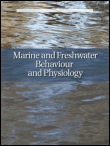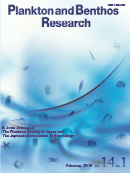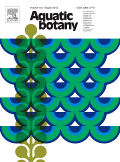
INTERNATIONAL REVIEW OF HYDROBIOLOGY
Scope & Guideline
Fostering Knowledge for a Sustainable Aquatic Future
Introduction
Aims and Scopes
- Aquatic Ecology and Biodiversity:
The journal primarily investigates the diversity of aquatic organisms and their ecological interactions, including studies on invasive species, community dynamics, and the effects of environmental changes on aquatic life. - Ecosystem Restoration and Management:
A significant focus is placed on restoration ecology, examining effective strategies to rehabilitate degraded aquatic habitats, including riverine and floodplain ecosystems, and the application of ecosystem services in management practices. - Impact of Environmental Changes:
Research on the effects of anthropogenic influences, such as pollution, climate change, and habitat modification on aquatic ecosystems is a core area, aiming to understand how these factors affect species distributions and ecosystem health. - Hydrobiology Methodologies:
The journal employs a variety of methodologies, including field studies, experimental approaches, and modeling techniques to address complex questions in hydrobiology, facilitating a comprehensive understanding of aquatic systems.
Trending and Emerging
- Impact of Climate Change on Aquatic Ecosystems:
Recent publications highlight the effects of climate change on biodiversity, species distribution, and ecosystem services, indicating a strong trend towards understanding how global warming affects aquatic environments. - Restoration Ecology and Management Practices:
There is an increasing focus on effective restoration techniques and management strategies for river and floodplain ecosystems, showcasing the importance of applied research in informing conservation efforts. - Ecosystem Services and Stakeholder Engagement:
Emerging themes include the application of ecosystem services concepts in stakeholder communication and management, emphasizing the need for collaborative approaches to address aquatic ecosystem challenges. - Functional Traits and Community Dynamics:
Research exploring functional traits of species and their roles in community dynamics is gaining prominence, reflecting a trend towards understanding ecological interactions and responses to environmental changes.
Declining or Waning
- Traditional Taxonomy and Systematics:
While taxonomy remains important, there appears to be a decreasing emphasis on traditional taxonomic studies, with a shift towards molecular techniques and ecological assessments taking precedence. - Studies on Non-native Species without Ecological Context:
There has been a reduction in publications focusing solely on the presence of non-native species without addressing their ecological impacts or interactions within ecosystems, indicating a move towards more integrated ecological studies. - Single-species Focus in Research:
Research that concentrates on single species without considering broader ecological interactions or community dynamics is becoming less common, as interdisciplinary approaches are increasingly favored to understand complex ecosystem functions.
Similar Journals

Inland Waters
Advancing Sustainable Solutions for Inland WatersInland Waters, published by TAYLOR & FRANCIS LTD, stands as a prestigious scholarly journal dedicated to the critical examination of freshwater ecosystems and their management. With an ISSN of 2044-2041 and an E-ISSN of 2044-205X, this journal boasts a remarkable Q1 ranking in both Aquatic Science and Water Science and Technology for 2023, reflecting its significant impact in the field. Researchers and professionals can benefit from its comprehensive coverage of cutting-edge research, methodological advancements, and policy implications concerning inland waters. Committed to disseminating valuable knowledge in a vital area of environmental science, Inland Waters aims to foster collaboration and promote innovative solutions for sustainable water management practices. As it continues through its converged years from 2012 to 2024, the journal remains an essential resource for those dedicated to advancing our understanding and stewardship of freshwater environments worldwide.

Aquatic Biology
Unlocking Secrets of Marine and Freshwater LifeAquatic Biology, published by INTER-RESEARCH, is a leading open-access journal dedicated to the scientific exploration of aquatic ecosystems, promoting innovative research in the fields of aquatic science, ecology, and oceanography since its inception in 2007. With an E-ISSN of 1864-7782, the journal publishes original articles, reviews, and data papers that contribute to the understanding of aquatic biology in its myriad forms. As of 2023, it holds a respectable Q3 ranking across multiple categories including Aquatic Science and Ecology, reflecting its sustained impact within the scientific community. Situated in Germany, Aquatic Biology operates a policy of open access since 2014, ensuring that valuable research findings are readily available to researchers, professionals, and students worldwide, thus fostering collaboration and knowledge dissemination. By addressing diverse aquatic topics, the journal plays a crucial role in advancing the study and conservation of marine and freshwater environments, making it an essential resource for anyone seeking to deepen their understanding of aquatic systems.

MARINE AND FRESHWATER BEHAVIOUR AND PHYSIOLOGY
Illuminating Interactions in Aquatic EcosystemsMARINE AND FRESHWATER BEHAVIOUR AND PHYSIOLOGY, published by Taylor & Francis Ltd, is a renowned academic journal dedicated to advancing the understanding of the behavioral and physiological aspects of aquatic organisms. Established in 1994, the journal serves as a pivotal platform for researchers and professionals in the fields of Aquatic Science and Oceanography, offering valuable insights into the interactions between aquatic species and their environments. With an impact factor reflecting its significance in the academic community, it occupies a notable position in Category Quartiles, currently ranking Q3 in both Aquatic Science and Oceanography. Researchers are encouraged to explore a wide range of topics reflecting the complexity and diversity of marine and freshwater ecosystems. Although the journal is not open access, its contributions continue to influence both current research and future investigations, making it an essential resource for anyone engaged in the study of aquatic life.

Journal of Oceanology and Limnology
Diving Deep into Aquatic Science DiscoveriesJournal of Oceanology and Limnology, published by SCIENCE PRESS, is a premier academic journal dedicated to advancing the fields of oceanography and limnology. With an ISSN of 2096-5508 and E-ISSN 2523-3521, this journal has emerged as a vital resource since its inception, aiming to disseminate cutting-edge research and comprehensive studies on aquatic environments. Based in China and indexed with notable rankings in Scopus, including a Q2 category in Oceanography and a Q3 category in Water Science and Technology, this journal significantly contributes to knowledge in these crucial scientific disciplines. The H-index for the journal is currently being established, reflecting its evolving impact within the academic community. Moreover, the open access model promotes wider dissemination, ensuring that research findings are accessible to a global audience. Covering a diverse range of topics from ecosystem health to climate impact on water bodies, the Journal of Oceanology and Limnology aspires to foster interdisciplinary dialogue and innovation among researchers, professionals, and students engaged in understanding and preserving aquatic life.

Inland Water Biology
Connecting Research with Freshwater ConservationInland Water Biology is a distinguished peer-reviewed journal published by MAIK NAUKA/INTERPERIODICA/SPRINGER, focusing on the intricate interactions within freshwater ecosystems. With its ISSN (1995-0829) and E-ISSN (1995-0837), this journal has established itself as an essential resource for researchers and professionals in the fields of Aquatic Science and Ecology, evidenced by its consistent ranking in the Q3 category for both disciplines in 2023. Covering a wide array of topics related to the biology of inland waters, the journal aims to disseminate cutting-edge research findings and theoretical advancements that contribute to the understanding of aquatic environments and their ecological significance. Although it does not offer open access, its impact in the academic community is noteworthy, ensuring that published works undergo rigorous peer review. Researchers, professionals, and students alike will find valuable insights and innovative approaches within its pages, making Inland Water Biology a vital addition to their academic endeavors.

Plankton & Benthos Research
Connecting Research and Innovation in OceanographyPlankton & Benthos Research, published by the Plankton Society of Japan, serves as a pivotal platform in the fields of Aquatic Science, Ecology, and Oceanography. With its inception in 2006 and ongoing publication until 2024, this esteemed journal focuses on the complex interactions within aquatic ecosystems, emphasizing the significance of plankton and benthic organisms in maintaining ecological balance. Although it is categorized in the Q3 quartile across several disciplines, it continues to provide valuable insights and a forum for researchers to share innovative findings and methodologies. The journal is not currently open access, which ensures a layer of curator-driven content quality. Its impact, measured through Scopus rankings, showcases its role in fostering knowledge exchange among academics and professionals engaged in ecological and environmental studies. With an ISSN of 1880-8247 and E-ISSN 1882-627X, Plankton & Benthos Research invites contributions that enhance our understanding of the aquatic realm, establishing itself as a crucial resource for ongoing research and advancement in these essential fields.

Latin American Journal of Aquatic Research
Empowering Researchers to Dive Deeper into Aquatic StudiesLatin American Journal of Aquatic Research (ISSN: 0718-560X) is a distinguished scholarly publication that has been paving the way for aquatic science research since its transition to Open Access in 2008, allowing unhindered access to diverse scientific inquiries conducted in Latin America and beyond. Published by Pontificia Universidad Catolica de Valparaiso in Chile, this journal serves as a vital platform for researchers and practitioners in the fields of Aquatic Science and Oceanography. With an esteemed Q3 ranking in both categories as of 2023, it is dedicated to disseminating high-quality research findings that address pressing ecological and biological challenges. The journal’s reach and impact are reflected in its Scopus rankings, where it stands at the 36th percentile in Oceanography and the 35th percentile in Aquatic Science. Researchers, professionals, and students alike will find valuable insights and data-driven articles that further the understanding of aquatic ecosystems, making it an essential resource for ongoing studies and future innovations.

OCEANOLOGICAL AND HYDROBIOLOGICAL STUDIES
Fostering collaboration for ocean conservation.OCEANOLOGICAL AND HYDROBIOLOGICAL STUDIES, published by WALTER DE GRUYTER GMBH, serves as a crucial platform for the dissemination and discussion of pivotal research in the field of oceanography and hydrobiology. With an ISSN of 1730-413X and an E-ISSN of 1897-3191, this journal highlights interdisciplinary studies that address pressing ecological issues impacting marine environments. Although it currently ranks in the Q4 category of oceanography journals and holds a Scopus rank of 96 out of 145, its commitment to publishing high-quality research positions it as a valuable resource for researchers, professionals, and students alike. As it converges into 2024, OCEANOLOGICAL AND HYDROBIOLOGICAL STUDIES remains dedicated to advancing our understanding of aquatic systems, contributing significantly to the scientific community's efforts in ocean conservation and management.

MARINE AND FRESHWATER RESEARCH
Diving into the dynamics of ecosystems.Marine and Freshwater Research is a prestigious journal published by CSIRO PUBLISHING that serves as a key platform for the dissemination of cutting-edge research in the fields of Aquatic Science, Ecology, and Oceanography. With an impactful presence since its inception in 1948, the journal provides critical insights into the dynamics of freshwater and marine ecosystems, promoting interdisciplinary approaches that contribute to our understanding of biodiversity and sustainability. Currently ranked in the Q2 category across major scientific domains, including Ecology and Aquatic Science, it enjoys a robust academic reputation supported by impressive Scopus rankings, such as Rank #66/247 in Aquatic Science and Rank #44/145 in Oceanography, reflecting its high citation impact and relevance. While offering a subscription-based access model, the journal remains dedicated to fostering dialogue and innovation within the scientific community, aiming to bridge the gap between research findings and practical applications in environmental management. Located in Australia, Marine and Freshwater Research is an essential resource for researchers, professionals, and students dedicated to exploring the complexities of aquatic ecosystems and advocating for their preservation.

AQUATIC BOTANY
Unveiling the complexities of aquatic plant life.Aquatic Botany, published by Elsevier, stands as an influential scholarly journal in the fields of Aquatic Science and Plant Science. Established in 1975, this esteemed journal has maintained a strong commitment to advancing our understanding of aquatic plant life, providing a platform for high-quality research that contributes to both ecological awareness and the sustainable management of aquatic ecosystems. With its impact factor reflecting a commendable ranking in the Scopus database—#169 in Plant Science and #95 in Aquatic Science—it is recognized for its valuable contributions to the scientific community, evidenced by its Q2 quartile ranking in both categories as of 2023. The journal does not currently offer open access, ensuring rigorous review and scholarly integrity while being accessible through institutional subscriptions. Set against the backdrop of the Netherlands, Aquatic Botany continues to be a vital resource for researchers, professionals, and students looking to explore the complex interactions between aquatic flora and their environment, aiming to inspire innovative ideas and practical solutions for aquatic conservation and management.